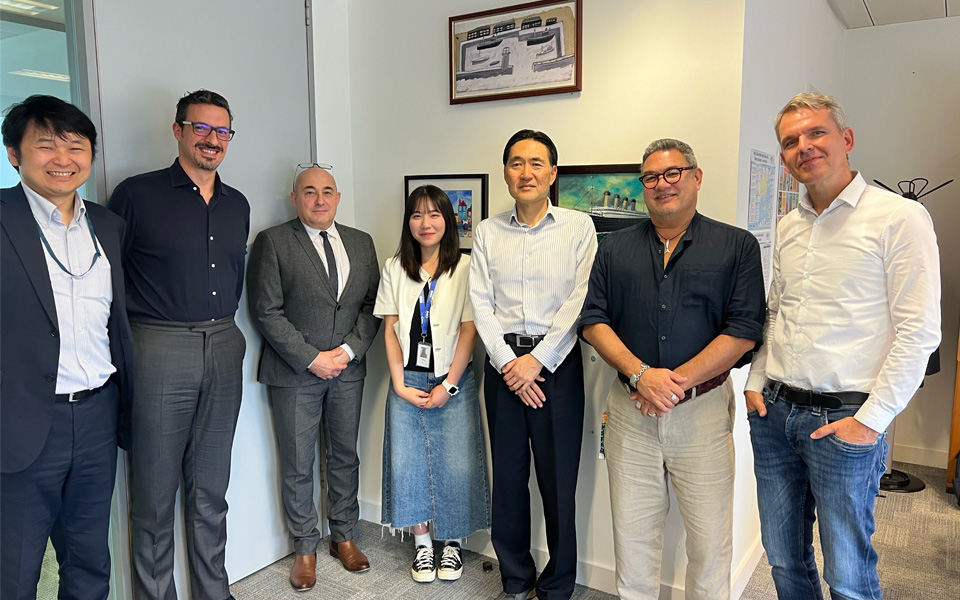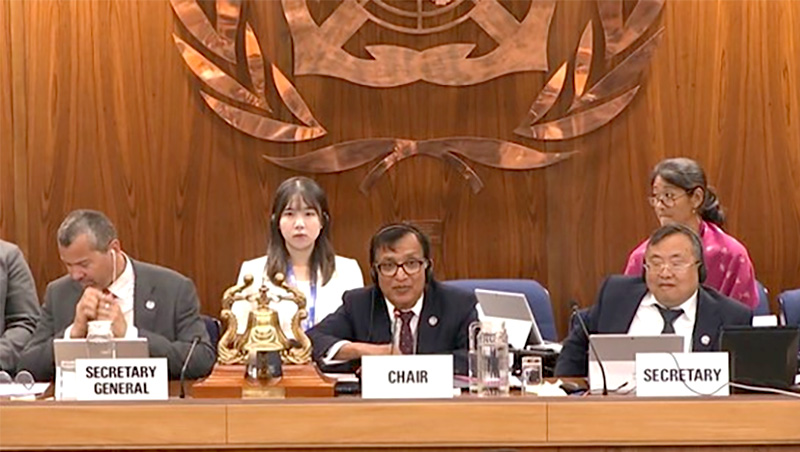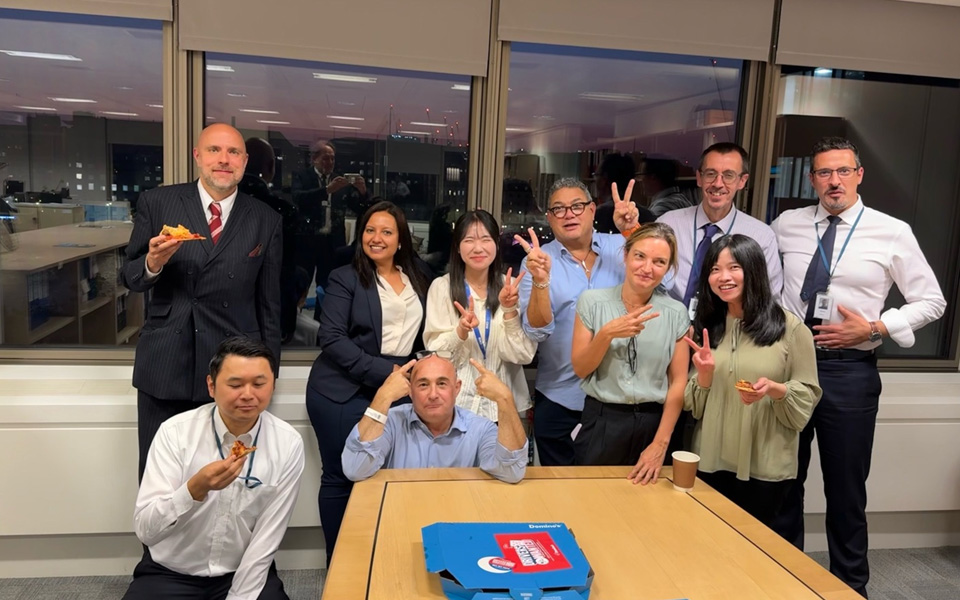Since its establishment in 1959, the International Maritime Organization (IMO), a specialized agency of the United Nations, has played a pivotal role in ensuring maritime safety and sustainability. It focuses on preventing maritime accidents, reducing ship-related pollution, and introducing autonomous vessels. By coordinating advanced technology regulations among its member states, IMO has set international standards in the shipping and shipbuilding industries.
Chae-song Jin, a third-year student in the Department of Naval Architecture and Ocean Engineering at SNU, participated in a three-month externship program at the Maritime Safety Division of the IMO in London last summer and shared her experience.
While a sophomore, Jin actively explored academic trends as a member of the Society of Naval Architects of Korea (SNAK)’s student press corps. During a trip to the UK, she boldly visited IMO headquarters in hopes of interviewing Kitack Lim, then Secretary-General of IMO. Although the interview did not materialize, she later learned in March that Lim was scheduled to deliver a lecture at SNU Kwanjeong Library. Jin seized this opportunity by requesting an interview through her department and SNAK. Through the interview, she became inspired by the IMO’s mission and activities. With her advisor’s recommendation, she applied for the externship program and was selected. Over the past three months, she gained invaluable experience addressing global maritime issues firsthand.

Participation in the IMO Externship Program
Witnessing the Birth of Regulations for Autonomous Ships
From September 9 to 13, 2024, Chae-song Jin attended a meeting at the IMO headquarters in London, where she observed the process of amending international regulations for Maritime Autonomous Surface Ships (MASS). During the session, discussions centered on expanding the scope of the Autonomous Navigation System (ANS) from the existing autonomous navigation to include remote navigation systems. Additionally, a proposed amendment was reviewed to mandate that all autonomous ships be equipped with machine-readable electronic navigational data, such as charts and publications. These amendments represent efforts to incorporate new technical requirements for MASS into international regulations. By closely observing this process, Jin gained firsthand insight into how international standards are developed and finalized. Reflecting on her experience, she shared, “Witnessing the birth of international regulations up close made me deeply appreciate the importance of global cooperation from the perspective of a naval architect. Interacting with experts from various countries also gave me an opportunity to broaden both my technical expertise and international outlook.”

Attending IMO Meetings
During her externship, Jin assisted her supervisor, who was responsible for drafting MASS regulations. This role helped her grasp the significance of addressing technical challenges and achieving international consensus. MASS, which operates without human intervention, represents a new technological paradigm in shipping, distinct from conventional practices. Jin noted, “It was fascinating to see concepts I learned in school appear in real meeting materials and eventually take shape as global standards. Watching experts engage in heated discussions for hours to finalize a single sentence or word made me realize the immense responsibility and effort behind even the smallest decisions.” She emphasized how striking it was to witness the collaboration between technical and international cooperation experts, underscoring the critical role of global teamwork in the regulatory process.
Proposing Solutions to Enhance Passenger Ship Safety
During her externship at the IMO, Chae-song Jin prepared a report addressing safety issues on domestic passenger ships. She analyzed international maritime agreements, including the Kuala Lumpur Agreement, and investigated real-world cases of these regulations being implemented through national policies and technologies. She particularly focused on how developing countries in Southeast Asia collaborate with Recognized Organizations (ROs) to address technical deficiencies and meet international standards. Jin also highlighted the crucial role of Port State Control (PSC) in enhancing passenger ship safety globally, noting that such measures do not apply to domestic passenger ships in South Korea. She proposed strengthening domestic regulations to align with these international standards. Reflecting on her research, Jin said, “This allowed me to gain a concrete understanding of how policies and technologies from different countries are integrated into safety standards and applied in practice.”
Jin further examined the impact of the 2014 Sewol Ferry disaster on South Korea’s passenger ship safety policies, analyzing the subsequent regulatory and institutional reforms. Her report detailed specific measures implemented by the Korean government, such as stricter cargo loading regulations, mandatory installation of AIS (Automatic Identification Systems), and the introduction of regular safety inspections. The improved crew training and qualification standards were emphasized as a model for implementation in developing countries. Feedback from her internationally diverse colleagues strengthened the structure and logic of her report. Jin shared, “I gained practical insight into how international maritime agreements and domestic policies interact, and I broadened my perspective on safety issues from an international cooperation standpoint.”

Chae-song Jin with IMO Colleagues
Jin expressed her pride and sense of mission as a Korean when she saw documents proposed by Korea adopted in international meetings and Korean researchers presenting their studies to delegations from various countries. She stated, “Through the IMO externship, I explored the future of naval architecture and learned the significance of global cooperation for shared goals such as marine safety and environmental protection.” Jin realized that naval architecture is not merely about solving technical challenges but also plays a crucial role in contributing to global safety and environmental preservation through international collaboration.
She expressed her aspirations to grow as a professional equipped with both technical expertise and international communication skills, striving to lead the sustainable development of the global shipbuilding and marine industries. “I am deeply grateful to the Department of Naval Architecture and Ocean Engineering at SNU, my professors, my colleagues at the IMO, and my family for their unwavering support,” she added. Jin also expressed her hope for increased institutional support to encourage students to take on global challenges more actively. She pledged to raise awareness of Korea’s capabilities in the international arena, contribute to the sustainability of naval architecture, and inspire future generations.
Written by a student reporter,
Songbae Jeon (Department of Nursing), thrxprcs@snu.ac.kr

